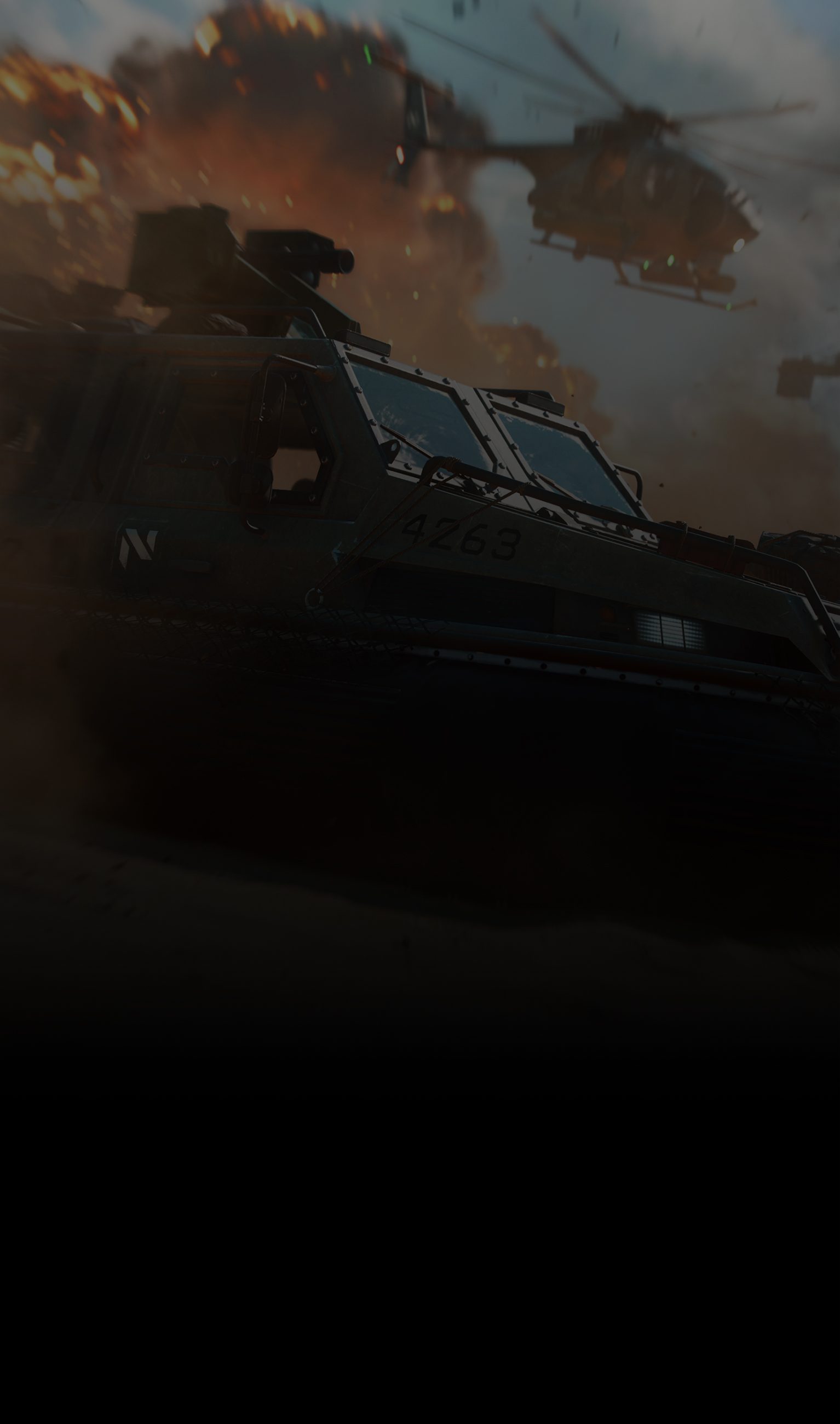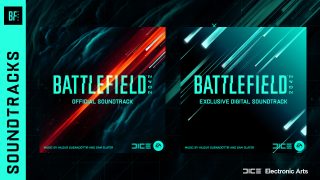

Battlefield Briefing: The Soundtrack of 2042
Ready your ears, No-Pats. The official Battlefield 2042 Soundtrack is here. Read on to find out how you can listen to it, and how composers Hildur Guðnadóttir and Sam Slater brought the soundtrack to life.
Spoiler alert: you might want to turn up the volume.
The Soundtrack

Battlefield 2042’s brings forth a chaotic and disruptive soundtrack fitting the World of 2042. It’s composed by Hildur Guðnadóttir and Sam Slater, both of whom composed and worked on the sound design for Chernobyl and Joker, for which they won an Oscar.
“Working with Hildur and Sam has been amazing! As composers, they bring a lot of new ideas to the table and we always welcome being challenged when it comes to creating video game music,” says Andreas Almström, Audio Director on Battlefield 2042.“To watch the creative process they use in order to help us conjure up this new soundscape...it’s just amazing to hear.”
Content Creators will have select tunes from the soundtrack cleared to use in streams and videos, and we encourage you to use them to enhance your content. You will also be able to use these tracks to make content during Battlefield 2042’s Open Beta, which runs from October 6th to October 10th (Early Access users will be able to play starting on October 6).
The Battlefield 2042 Official Soundtrack is available for purchase on iTunes and other major digital music services worldwide. The soundtrack is currently available to be streamed (and purchased) on Spotify, Apple, Amazon, Google, Deezer, and Tidal.
For the collectors out there: Lakeshore Records and Invada Records are teaming up to bring the Battlefield 2042 Official Soundtrack to vinyl at a later date!
Already want a quick taste of the soundtrack? We’ve already included three tracks for you right here, as well as two exclusive tracks for this Battlefield Briefing:
Battlefield 2042 Theme - For their take on the series’ classic theme, composers Hildur Guðnadóttir and Sam Slater dismantled the theme and built it from the ground up to fit into the tumultuous world of Battlefield 2042. You can find out more about their process in the interview below.
Orbital - This chaotic, percussion-heavy track was created to compliment Orbital’s tension between the elements of nature and humanity’s creations.
The Observation of Beautiful Forms - A stirring, melancholic track conveying a messy and transitional world.
Unwave - An unnerving and creeping piece that ramps up the tension as the beat goes on.
Dry Ice - A tingling, electric herald of the disorder to come, this one makes the hairs on the back of our necks stand.
Crafting 2042’s Sound
To give you a better sense of the craft behind Battlefield 2042’s Official Soundtrack, we talked with Hildur Guðnadóttir and Sam Slater about how they crafted Battlefield 2042’s chaotic soundscape, and what it was like creating their first video game soundtrack.

This is your first game soundtrack. What was it like composing for a game instead of a film?
Hildur: That music is nonlinear in games was the big one. That shift was something we were both interested in and keen to try out, so that was one of our main motivations for working with DICE. Nonlinearity seems like a great way to work with sound and music in a more open way; you have more possibilities for things to change and develop as you work. Creating music for a project that’s interactive is just a different way of writing and that was interesting for us as composers.
We’re also interested in the mix between sound design and music, and this seemed a great environment to blend the two. The worlds created in Battlefield 2042 are spectacular and visceral; they’re really moving places and we wanted to create an audio experience that complimented that level of visual immersion.
Our approach was to base each soundworld in the materials of each map as every location has very distinct material characteristics. For example, in Hourglass, where glass and sand are the strongest elements, we worked to make music out of those particular elements in order to bring the player into the world.
Sam: I think what a game like Battlefield 2042 provides that a film doesn’t is that the audience is located within a space. In this case, each level references worlds that exist in 2021 but they’re also totally artificial since they’re imagined futurescapes in 2021. That artificialness gives us license with the sounds to take these elemental, material ideas, to stretch them and exaggerate them in much the same way that the visual concepts in Battlefield are real yet stretched.
We were excited to take these earthy and elemental material sounds and manipulate them until you get a whole world of sound that’s created from the interactions of objects in the game, thereby dissolving the boundaries between sound-design and music.
How did you start working on Battlefield 2042, and what reference materials did you have?
Hildur: We’ve been working on the project for about a year and a half now. At the beginning, we were working with concept art for the maps. They were mostly reference pictures that were inspirational to DICE level designers and those materials became more in-depth and refined as we continued to work.
Eventually, we got video run-throughs of each map. The nice thing about this process is it enables you to use your imagination. That’s why the material aspect of our composition focus is so important to us because the rocks and the glass, the rust and mud - the elemental aspects - were a huge part of what we were working with early on. We weren’t looking at armies. We were looking at rocks and ships, terrain, and so on.
What was it like working with DICE on bridging the audio and the soundtrack?
Hildur: We were in an in-depth conversation with the sound team during the entire project, with weekly meetings where we discussed audio and the soundscape. It was a very constructive and open dialogue. There was never “No, this wouldn’t work” but more “Ooh, what about this?” Everyone on the team is just so creative and has so much experience. The knowledge bank they have when it comes to sounds and recording sounds is so vast. The conversation was always inspiring.
Sam: The process was fantastic because, unlike films where sound and music teams are more distinct, in Battlefield 2042 we were all just part of the audio team. Therefore, all the conversations we were having musically were also influencing the sound design or vice versa. Early on, we established the elemental material themes and an idea of tension between two materials. So, for example, in Orbital, there’s a tension between these futuristic, technical ideas and green, disorganised nature. In others it’s glass and sand, metal and mud.
We established thematic ideas and began collecting huge amounts of material through experimentation. The process was about working out which sounds alluded to which environments and then the last months have been about ensuring the sounds fit the flow of the game.
We have whole suites of pieces describing worlds we built from dialogues with the sound design team, and a lot of that has ended up on the soundtrack. The Battlefield 2042 Audio Director, Andreas Almstrom was determined. He said This is not going to be a normal game score. Let’s do this, and he held fast to that idea! So we were excitedly pushed along by the team to try new things.
What would you say is the defining quality of the soundtrack?
Sam: Chaotic futurism!
Hildur: ‘Disruption’ was a word that came up a lot. Ben Minto, The Head of Audio at DICE was like “This needs to be disruptive!” [laughs] In the game, nature is taking the world back from man and I think that the sound and the music really emphasises that.
Sam: When people deal with the future in creative works, often it’s “utopic” or “dystopic.” With Battlefield 2042, it’s neither. There isn’t a judgment on good or bad, instead there are both challenging and hopeful aspects of these worlds. What was really clear was that these worlds are messy. There is a tension between man and the environment. It was important to ensure the music recognized that tension. An important part of this chaotic futurism is that it’s not the year 2300 with laser guns. This future is just down the road and it’s messy and transitional and we’ve really tried to get those aspects into the soundworld.
Hildur: Because it’s so close in time but also in the near future, we didn’t want the soundscape to be overly familiar. We felt it was important not to use orchestral music, which often speaks more to a glorified past, but to do something forward-looking. We wanted to ask, What does the near future, in this disruptive world where nature is breaking apart, sound like?
How did you put your own spin on the Battlefield theme?
Hildur: We tried to be respectful as it’s a theme a lot of people have grown up with. It’s interesting to grow up with a piece of music and see what it does to you emotionally. Hearing the first few notes of something important to you, like your favorite TV show theme, gets you fired up and brings you to a special space. We wanted players to get that feeling and at the same time, bring that theme to this new disrupted world. So we needed to make the theme feel slightly torn apart; it was dismantled and brought back together in a way we hope speaks to the players.
Sam: I think many people will have an idea of what the sound of Battlefield is through this theme and go Oh, this is the thing I love but also so much more. It’s a great way of pulling them into this new soundworld without scaring anyone off, and instead making them excited. That’s the opportunity we saw in the theme: let’s bring all these players along for this ride.
Which track had the most interesting creation process?
Sam: “Hauled Over Coals” has four buckets filled with different materials from the level with four big bass drivers underneath it. We were literally shaking the level around in a bucket and a track appeared out of that!
There’s also the track we created for the map Breakaway, which is made from a submarine we recorded in France and processed through a bunch of amplifiers.
We also built a machine-recording algorithm with a coder so that we could create instruments made from materials in the game world; they created a strange hybridisation of the materials in conflict in the level and ended up producing much of the melodic sounds on the soundtrack.
Hildur: You’re essentially creating an instrument out of the material that’s dominating the environment of the map, for example the timbre qualities of metal forcing itself onto the pitch information of ice-cracking. It was part of our attempt to envision the soundscape of this chaotic future.
What are some of the most interesting instruments you used when creating the tracks?
Hildur: Well, there was the fire blanket.
Sam: [chuckles] For some of the more space exploration-oriented maps, we had percussionists perform with instruments made out of foil fire blankets. These made many of the bursts of intense white noise throughout the soundtrack.
On Orbital, the main melodic sound is a contact microphone and a loudspeaker creating a feedback loop through a piece of sheet metal. You feed the mic back through the speaker and as you bend the metal, it finds different resonances, creating strange, brass-like melodic phrases.
Do you consider yourself gamers? How does your experience with gaming inform the work you’ve done on Battlefield 2042?
Sam: Not really, no. We have an appreciation of games from a distance.
Hildur: I think EA was also quite keen on doing something they hadn’t done before with the soundtrack. It almost felt like a requirement that we weren’t from the gaming world and that we were coming from a different side of the table somehow. I think being new to this whole world also helped feed into our curiosity as we delved deeper into the project. When you enter a world with a beginner’s mind, your curiosity is just more alert and awake because everything is so new to you. So that was our mindset throughout the whole project, basically.
How did you find the fun in creating such a dark, chaotic soundtrack?
Hildur: I think people find my music dark and melancholic, but I’m naturally a cheerful person. Having fun is a crucial part of the working process for us both. It’s important that the driving force of making music is exploration and having fun.
Sam: It’s worlds in the game that make the soundtrack dark and chaotic. I think fun is what dictates whether your darkness has a sense of energy in it, because how you approach these topics is important to motivate yourself to work within them. I mean…I don’t think I could hang out with Hildur if her personality was like her music.
Hildur: [laugh]
Sam: I couldn’t! It’s doomy and she’s not. But at the same time we’re both people who are excited for the exploratory process and the practice of making these worlds. I think if you’re having fun or not is what decides if your work is good or interesting, not whether it’s dark or light.
Lastly, do you have anything you want to say to the player community?
Hildur: Have fun with the doom! [laugh]
Sam: We have a lot of gratitude. There are many active Battlefield players and it takes trust to put something unusual in that environment. I think that’s been the focus of every single team on this project: respect the things Battlefield players love but also do it in a new way that takes things even further. I think we’re all quite grateful for the chance to do that, and we hope you will enjoy it!
We hope you’ll enjoy the soundtrack, and we’d love to hear which track is your favorite. Lastly, the Open Beta is just around the corner and we’re looking forward to seeing you there with early access starting on October 6.
Stay safe, No-Pats.
